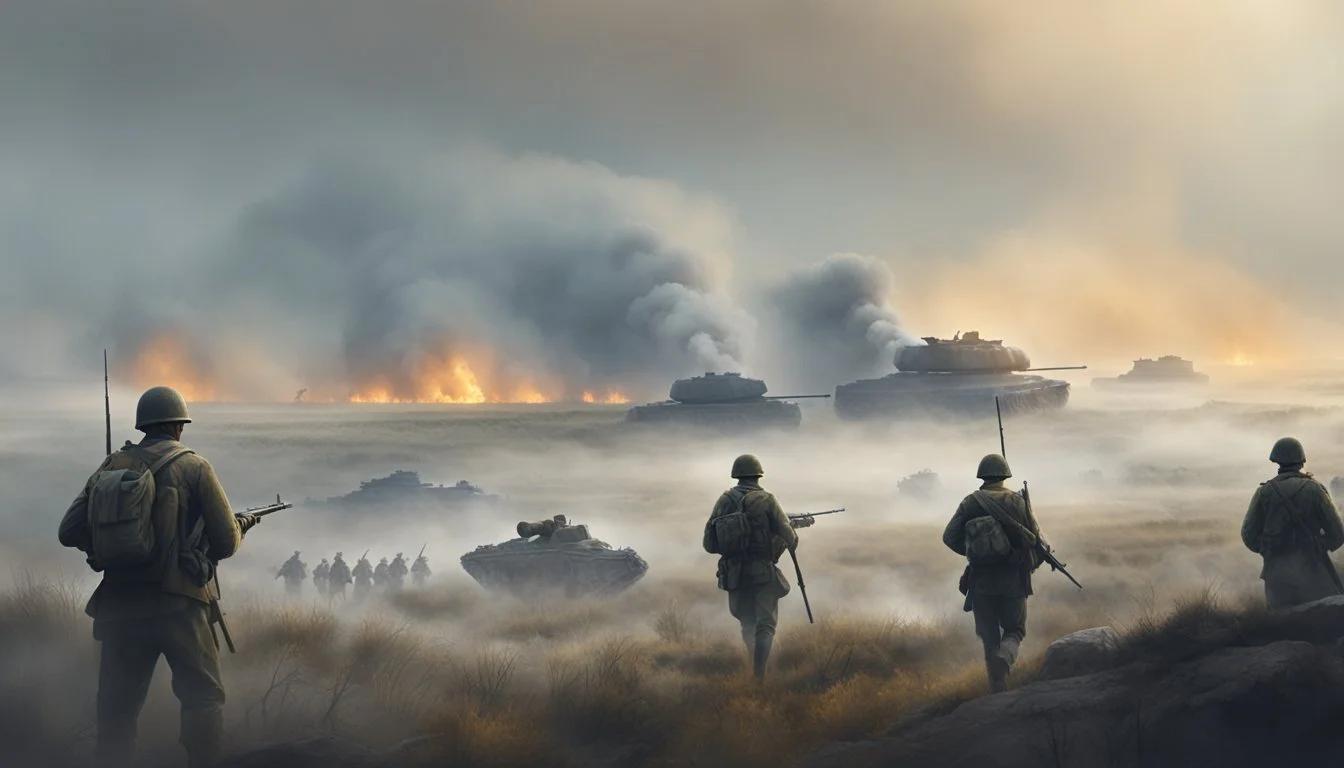8 Documentaries That Will Captivate Every History Buff
From Ancient Civilizations to Modern Marvels
Documentaries provide a unique window into the past, offering history enthusiasts an immersive experience that brings historical events and figures to life. Through carefully curated footage, expert interviews, and compelling narratives, these films transport viewers across time and space, deepening their understanding of pivotal moments that shaped our world.
For those with a passion for history, documentaries serve as both educational tools and sources of entertainment. These eight documentaries stand out for their ability to captivate audiences while shedding light on lesser-known aspects of historical events, figures, and cultural phenomena. From ancient civilizations to modern conflicts, each film offers a fresh perspective on the subject matter, challenging viewers to reconsider their assumptions about the past.
1) The Civil War (by Ken Burns) [1990]
Ken Burns' epic documentary series "The Civil War" stands as a landmark in historical filmmaking. This nine-part masterpiece offers a comprehensive look at America's bloodiest conflict.
Burns skillfully weaves together archival photographs, expert commentary, and first-hand accounts to bring the war to life. The series explores the causes, major battles, and lasting impacts of the conflict.
Shelby Foote's storytelling provides a Southern perspective, though his interpretation has faced criticism. The documentary's use of period music and letters read by actors adds emotional depth to the historical narrative.
"The Civil War" covers key figures like Abraham Lincoln, Robert E. Lee, and Ulysses S. Grant. It also highlights the experiences of ordinary soldiers and civilians caught in the turmoil.
The series garnered critical acclaim and numerous awards, including two Emmy Awards. It remains a vital resource for understanding this pivotal period in American history.
More information on The Civil War documentary series
2) The World at War (1973)
The World at War stands as a landmark documentary series on World War II. Produced by Thames Television, it spans 26 episodes and provides a comprehensive look at the conflict.
Narrated by Laurence Olivier, the series features interviews with key historical figures and eyewitnesses. It covers major events and battles from various perspectives, including both Allied and Axis accounts.
The documentary's production values were groundbreaking for its time. It incorporates rare archival footage, much of which had never been seen before by the public.
The World at War examines not just military aspects, but also the war's social and political impacts. It explores topics like the rise of fascism, life on the home front, and the Holocaust.
Despite being produced in the 1970s, the series remains highly regarded by historians and viewers alike. Its thorough research and balanced approach continue to set a high standard for historical documentaries.
More information on The World at War
3) The Fog of War
The Fog of War (2003) offers a captivating glimpse into the mind of Robert S. McNamara, former U.S. Secretary of Defense. Directed by Errol Morris, this documentary explores McNamara's role in shaping American military policy during the mid-20th century.
Through a series of interviews, McNamara reflects on his experiences during World War II, the Cold War, and the Vietnam War. He shares insights on decision-making in times of conflict and the complexities of modern warfare.
The film's title refers to the uncertainty and confusion that often surrounds military operations. McNamara's candid reflections provide viewers with a unique perspective on pivotal moments in American history.
Accompanied by Philip Glass's haunting score, The Fog of War presents a thought-provoking examination of war, politics, and human nature. It challenges viewers to consider the moral implications of military decisions and their long-lasting consequences.
This Academy Award-winning documentary serves as a powerful reminder of the challenges faced by those in positions of power during times of international conflict.
More information on The Fog of War
4) Prohibition: A Film by Ken Burns (2011)
Ken Burns and Lynn Novick's documentary series "Prohibition" examines the rise and fall of the 18th Amendment to the U.S. Constitution. The three-part, five-and-a-half-hour film explores the era of banned alcohol in America.
The series delves into the century of activism that led to Prohibition, aiming to improve and ennoble American lives. It chronicles the societal changes, political maneuvering, and cultural shifts that occurred during this tumultuous period.
Burns' signature style brings the Prohibition era to life through archival footage, photographs, and expert interviews. The documentary covers the impact of the temperance movement, the rise of organized crime, and the eventual repeal of the amendment.
"Prohibition" offers a comprehensive look at a pivotal time in American history. It showcases the unintended consequences of the noble experiment and its lasting effects on U.S. society.
More information on "Prohibition" by Ken Burns
5) 13th (2016)
Ava DuVernay's documentary "13th" offers a powerful examination of the U.S. criminal justice system and its impact on African Americans. The film's title refers to the 13th Amendment, which abolished slavery except as punishment for a crime.
DuVernay explores how this loophole has been exploited, leading to mass incarceration disproportionately affecting Black communities. The documentary traces this issue from the end of the Civil War through the present day.
"13th" features interviews with activists, politicians, and scholars, providing diverse perspectives on the topic. It examines policies like the "war on drugs" and mandatory minimum sentencing, showing their effects on imprisonment rates.
The film uses archival footage and contemporary interviews to illustrate its points. It draws connections between historical racism and modern-day inequalities in the justice system.
DuVernay's work challenges viewers to consider how systemic racism continues to shape American society. The documentary has been praised for its thorough research and compelling presentation of complex issues.
More information on "13th" (IMDB)
6) The Act of Killing (2012)
"The Act of Killing" is a groundbreaking documentary that explores the aftermath of the Indonesian mass killings of 1965-66. Directed by Joshua Oppenheimer, the film takes an unconventional approach to examining this dark chapter in history.
The documentary follows former Indonesian death squad leaders as they reenact their past crimes. These men, who were responsible for countless murders, are given the opportunity to create cinematic scenes depicting their actions.
Through this unique method, the film reveals disturbing insights into the psychology of mass killers and the lasting impact of historical violence on society. It challenges viewers to confront uncomfortable truths about human nature and the capacity for evil.
"The Act of Killing" received widespread critical acclaim for its bold and innovative storytelling. It sparked important conversations about accountability, memory, and reconciliation in post-conflict societies.
The film's unflinching portrayal of its subjects and its exploration of complex moral issues make it a must-watch for history enthusiasts seeking a deeper understanding of historical atrocities and their long-term consequences.
More information on The Act of Killing
7) Apollo 11 (2019)
Apollo 11 is a groundbreaking documentary that offers an immersive experience of the historic 1969 moon landing mission. Directed by Todd Douglas Miller, the film relies entirely on archival footage, including previously unreleased 70 mm film.
The documentary presents the Apollo 11 mission in a unique and captivating way. It showcases the journey of astronauts Neil Armstrong, Buzz Aldrin, and Michael Collins from Earth to the moon and back.
Viewers are treated to stunning visuals of the Saturn V rocket launch and the lunar landing. The film also captures the tension and excitement surrounding this monumental achievement in human history.
Apollo 11 stands out for its lack of narration or interviews. Instead, it allows the original footage and audio recordings to tell the story, creating a more authentic and immediate viewing experience.
The documentary received critical acclaim for its technical achievements and ability to make viewers feel as if they were witnessing the moon landing firsthand. It offers both space enthusiasts and history buffs a fresh perspective on this pivotal moment in space exploration.
More information on Apollo 11 (2019)
8) Ancient Aliens
"Ancient Aliens" is a television series that explores controversial theories about extraterrestrial influences on human civilization throughout history. The show premiered in 2009 and has since produced numerous seasons.
Each episode of "Ancient Aliens" examines historical artifacts, sites, and legends through the lens of potential alien involvement. The series covers a wide range of topics, from ancient monuments to religious texts.
One of the central figures in "Ancient Aliens" is Giorgio A. Tsoukalos, known for his distinctive hairstyle and enthusiastic presentations. The show features interviews with various researchers, authors, and theorists who discuss alternative explanations for historical mysteries.
"Ancient Aliens" has gained a significant following, sparking debates about the origins of human civilization and technological advancements. While many scientists criticize the show's claims, it continues to captivate audiences with its thought-provoking content.
The series has spawned spin-offs, books, and merchandise, cementing its place in popular culture. Its impact extends beyond entertainment, influencing discussions about history, archaeology, and the possibility of extraterrestrial life.
More information on Ancient Aliens (2009)
The Role of Documentaries in Understanding History
Documentaries serve as powerful tools for exploring and presenting historical events, figures, and periods. They bring the past to life through visual storytelling and expert analysis.
How Documentaries Shape Historical Perspectives
Documentaries offer unique insights into historical events by presenting primary sources, expert interviews, and archival footage. They can challenge existing narratives and shed light on lesser-known aspects of history.
Visual elements in documentaries help viewers connect emotionally with historical subjects. This connection often leads to a deeper understanding and retention of information.
Many documentaries incorporate multiple viewpoints, allowing audiences to consider different interpretations of historical events. This approach encourages critical thinking and a more nuanced understanding of complex historical issues.
The Art of Storytelling in Historical Documentaries
Skilled documentarians use narrative techniques to make history engaging and accessible. They craft compelling storylines that draw viewers in and maintain their interest throughout.
Visual aids such as maps, timelines, and reenactments help clarify complex historical concepts. These elements make abstract ideas more concrete and easier to grasp.
Documentaries often humanize historical figures by exploring their personal lives and motivations. This approach helps viewers relate to historical subjects on a more personal level.
The use of dramatic music and pacing in documentaries can heighten emotional impact and emphasize key moments in history. These techniques create a more immersive viewing experience.
Evaluating Accuracy and Bias in Historical Documentaries
Assessing historical documentaries requires critical thinking skills and careful analysis. Viewers should examine both factual accuracy and potential biases to fully understand the presented narrative.
Techniques for Fact-Checking
Cross-referencing information with reputable sources is essential. Check claims against peer-reviewed academic publications, primary historical documents, and respected history books.
Look for documentaries that cite their sources clearly. Those that provide a bibliography or list of expert consultants often demonstrate stronger research.
Pay attention to dates, names, and specific events mentioned. Even small inaccuracies can indicate larger issues with the documentary's overall reliability.
Consider the qualifications of interviewed experts. Historians specializing in the relevant time period or subject matter lend more credibility to the content.
Recognizing Potential Bias in Narratives
Examine the documentary's funding sources and production team. These can influence the angle and emphasis of the storytelling.
Note which perspectives are highlighted and which are downplayed or omitted. A balanced documentary should present multiple viewpoints on controversial topics.
Be aware of emotional language or dramatic reenactments that might sway viewers' opinions. Objective documentaries tend to use more neutral tones.
Consider the historical context of when the documentary was made. Social attitudes and available information at the time of production can impact the narrative.
Look for oversimplification of complex events. Quality documentaries acknowledge nuances and avoid presenting history as a simple good-versus-evil story.



